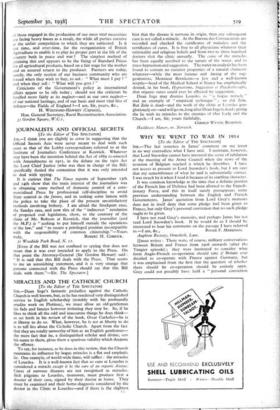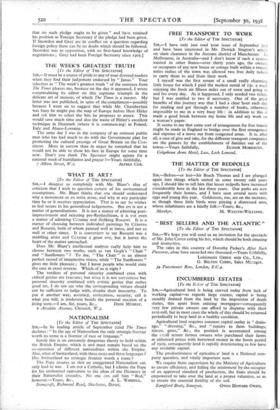WHY WE WENT TO WAR IN 1914 [To the Editor
of THE SPECTATOR] WHY WE WENT TO WAR IN 1914 [To the Editor of THE SPECTATOR] SIR,—The last sentence in Janus' comment on my letter in no way contradicts what I have said. I maintain, however, that Lord Snowden cannot have invented the scene of jubilation at the meeting of the Army Council when the news of the invasion of Belgium reached it which he describes. I have not access at present to Lord Snowden's book, but I am sure that my remembrance of what he said is substantially correct. I was struck by it when I read it because of its startling character.
It was common knowledge at the time that a definite portion of the French line of Defence had been allotted to the Expedi- tionary Force, and' this in itself surely presupposes some previous understanding between the English and French Governments. Janus' quotation from Lord Grey's memoirs does not in itself deny that some pledge had been given to France, but only Grey's personal conviction that no such pledge ought to be given.
I have not read Grey's memoirs, and perhaps Janus has not read Lord Snowden's book. If he would do so I should be interested to hear his comments on the passage I have referred
to.—I am, &c., ROGER F. MARICHAM. Aughton Rectory, Ormskirk, Lane.
[Janus writes : There were, of course, military conversations between Britain and France from 1906 onwards (after the Tangier episode) ; they were instituted to consider what form Anglo-French co-operation should take if Britain ever decided to co-operate with France against Germany, but it was emphasised from the first that the question of whether there should be co-operation should be entirely open. Grey could not possibly have held a " personal conviction
that no such pledge ought to be given " and have retained his position as Foreign Secretary if the pledge had been given. If Snowden and Grey are in conflict on a question regarding foreign policy there can be no doubt which should be followed. Snowden was in opposition, with no first-hand knowledge of negotiations ; Grey had been Foreign Secretary since t9o5.]















































 Previous page
Previous page